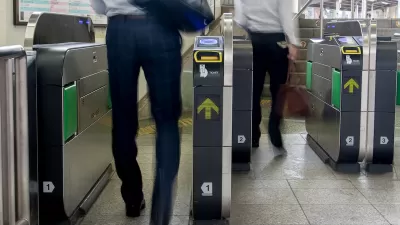Compounding the pain caused by decreased funding from local and national sources, transit agencies across the country are haunted by "toxic pre-recession bank deals" that have them paying exorbitant borrowing costs.
Angie Schmitt discusses findings included in a new report by Refund Transit, a coalition of transit unions and community organizations, that investigates the effect that interest rate swaps - "deals that were supposed to protect transit agencies against increases in borrowing costs" - are having on agencies across America.
With interest rates at historic lows, and transit agencies "stuck paying many times the current competitive rates," agencies are suffering from the very impacts that the interest rate swaps were supposed to protect them from.
According to Schmitt, "Refund Transit's survey of 12 major transit providers found that public transportation agencies were overpaying by $529 million thanks to these deals, which were sold as a way to minimize risk and save money. Los Angeles's transit system is losing $19.6 million annually compared to the interest rates they would otherwise be paying. Detroit - where low-income workers face up to three-hour transit waits and are occasionally stranded - loses $54 million annually. The state of New Jersey's transit system loses $83 million, according to the report."
The Refund Transit coalition, which includes the Amalgamated Transit Union, the Transportation Equity Network, and grassroots community groups, are calling on banks, many of which of course "were insulated from the economic crash by taxpayer funds," to "voluntarily renegotiate these deals."
Good luck with that.
FULL STORY: Toxic Pre-Recession Bank Deals Haunt Struggling Transit Agencies

Planetizen Federal Action Tracker
A weekly monitor of how Trump’s orders and actions are impacting planners and planning in America.

Restaurant Patios Were a Pandemic Win — Why Were They so Hard to Keep?
Social distancing requirements and changes in travel patterns prompted cities to pilot new uses for street and sidewalk space. Then it got complicated.

Maui's Vacation Rental Debate Turns Ugly
Verbal attacks, misinformation campaigns and fistfights plague a high-stakes debate to convert thousands of vacation rentals into long-term housing.

In California Battle of Housing vs. Environment, Housing Just Won
A new state law significantly limits the power of CEQA, an environmental review law that served as a powerful tool for blocking new development.

Boulder Eliminates Parking Minimums Citywide
Officials estimate the cost of building a single underground parking space at up to $100,000.

Orange County, Florida Adopts Largest US “Sprawl Repair” Code
The ‘Orange Code’ seeks to rectify decades of sprawl-inducing, car-oriented development.
Urban Design for Planners 1: Software Tools
This six-course series explores essential urban design concepts using open source software and equips planners with the tools they need to participate fully in the urban design process.
Planning for Universal Design
Learn the tools for implementing Universal Design in planning regulations.
Heyer Gruel & Associates PA
JM Goldson LLC
Custer County Colorado
City of Camden Redevelopment Agency
City of Astoria
Transportation Research & Education Center (TREC) at Portland State University
Camden Redevelopment Agency
City of Claremont
Municipality of Princeton (NJ)





























